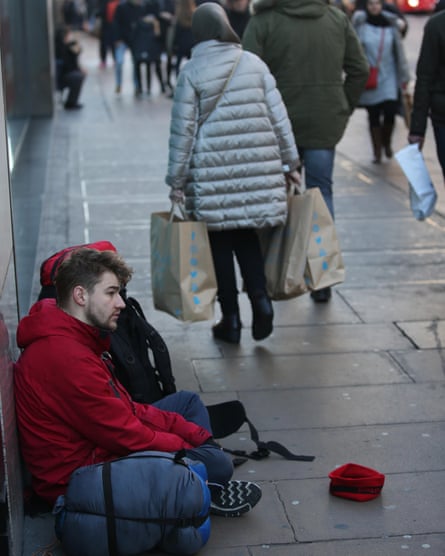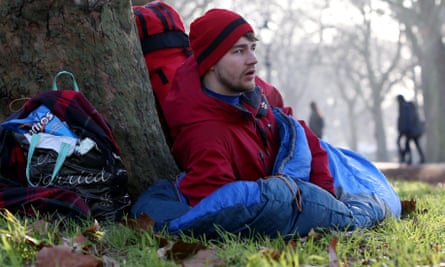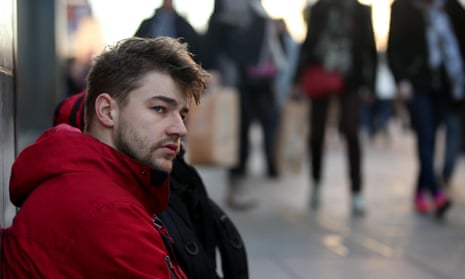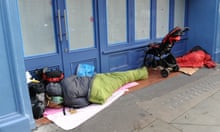This is my 27th out of 31 days rough sleeping in central London. I’m not using any charity facilities; I am begging for money to survive – so washing and showering has been in cafe toilets with my foot against the door, or sneaking into the hospital as there are no free public bathrooms around.
I’m not homeless. I’ve got a countdown on my hand until I stop this project on Monday, and take a flight back to catch my 9am anatomy lecture in Aberdeen, where I’m studying to be a doctor.
I am raising money for the homeless charity Crisis, which each Christmas offers temporary shelter to more than 4,000 people who have no home. I wanted to do this is because homelessness can affect anybody. The number-one cause is relationship breakdown, while more than 80% of the homeless community report having a mental health problem. And the number of rough sleepers is rising: in London alone, outreach workers saw more than 8,000 people sleeping on the streets between April 2015 and last March.
In the last month alone, there have been two headlines about homeless people being set on fire in the UK. Homeless people are 17 times more likely to be a victim of violence, mostly at the hands of the public.

Four years ago, I decided to sleep rough over Christmas for one week to raise money for charity, so this time had to be longer to be more impactful. It is not a vanity project; I believe that this way – sleeping rough, leaving friends and family behind, begging for food to survive – gives me a better perspective on the issue, and could even act as a bridge to others understanding this marginalised community better. If nothing else, at least I’ll have raised some money to get people into shelters over Christmas where they’ll get warm food, a place to rest and a route into longer-term support.
The reality is that society has dehumanised homeless people. They are seen as intimidating – but during my time on the streets, it’s not the homeless community I’ve felt afraid of; it’s some of the general public who have made me feel intimidated and vulnerable. I’ve been spat on, and endlessly ignored. There have been times when not a single person has looked at me for at least two hours.
To sit on a cold, hard pavement and get out the words “please do you have any change?” is tough, especially the first time – you start so quietly. It immediately puts you in a position of isolation.
A few days ago, when I was sitting outside Hamleys toy shop on Regent Street, someone accidentally knocked over the cup I was using to beg. The woman turned back to apologise, saw who I was, and immediately turned around again without saying a word, seemingly inconvenienced and annoyed.
This is most people. They pull their daughters and sons away from you. You feel dirty, grubby. Because of this, you become extremely paranoid when you sleep on the streets. A Crisis report released before Christmas highlighted the shocking levels of violence and harassment aimed at homeless people, with more than one in three rough sleepers being deliberately hit or kicked.

I can’t sleep with my sleeping bag closed because, if someone comes to attack me, I’ll be trapped. A guy once threw a glass bottle right next to me when I was sleeping. I’m not so scared of being beaten up, but I worry about knives or sexual assault. All it takes is for someone to put something in the food they give you.
But I feel less vulnerable when there are other homeless people around. I’m obviously fresh on the streets, and only 26, so others have brought me extra cardboard to sleep on. I was even given a Christmas present by another homeless man – a clean sports shirt that had been donated to this man who has nothing.
You have to consider your vulnerabilities – both to the public and the weather – when you’re finding a spot to sleep. You need a place that’s sheltered to keep dry, and ideally out of the wind. If your cardboard gets wet it’s useless, and that’s what stops the concrete from sapping the heat out of you.
At most, I’ve been living off two-to-three hours’ sleep a night, because of the noise, the paranoia and the cold. When the weather reached minus temperatures after Christmas, I spent my begging money on foil to wrap around my wrists, ankles and tummy. It keeps you insulated, but falls apart quite quickly.
There are nights when it’s been so cold I’ve had to make myself a cardboard tunnel – it leaves you defenceless, but it helps keep the wind out. I’m short of breath, my chest is tight and the weight has stripped off me. Recently I heard about two deaths of rough sleepers in the cold in Chatham, Kent, just before the opening of a winter centre there. Those deaths were preventable.
Every night you get through without an incident makes you more attached to that particular sleeping spot. I started improving my last place, under some scaffolding near Regent Street. I put a roof on it with bits of cardboard – it was becoming more like Bear Grylls than sleeping on a pavement – but suddenly it was sealed off and taken away.
Waking up in the morning with no money, I have to go out and beg. It’s hard having to do that before you can eat because you feel frantic, you get more desperate – and then people don’t give you as much.
If you can get a sign it helps, but I’ve found that you have to keep you head down; if someone catches your eye, they’ll walk away quickly. If you walk around asking people directly, it can be dangerous because you’re forcing strangers into a situation where they have to react to you – they have no choice but to acknowledge you. If that doesn’t work, you search for leftover food in bins.
Over the last eight years of working with homeless people, and especially over this past month on the streets, I’ve gained an enlightened perspective of a community that is completely excluded from mainstream society. And I’ve also seen a darker side to London; a side that lacks empathy and compassion.
But it’s not always the case. I have woken up to find someone has left food near my head. A stranger once brought me a cup of tea they’d made at home. And on most evenings, I see volunteers giving care packages and warm drinks to rough sleepers. You don’t expect everyone to give you a couple of quid – but just by smiling or saying hello, they can help bridge the widening gap that society has created.
James Beavis was talking to Naomi Larsson; read more about his month on the streets here. Follow Guardian Cities on Twitter and Facebook to join the discussion, and explore our archive here










Comments (…)
Sign in or create your Guardian account to join the discussion